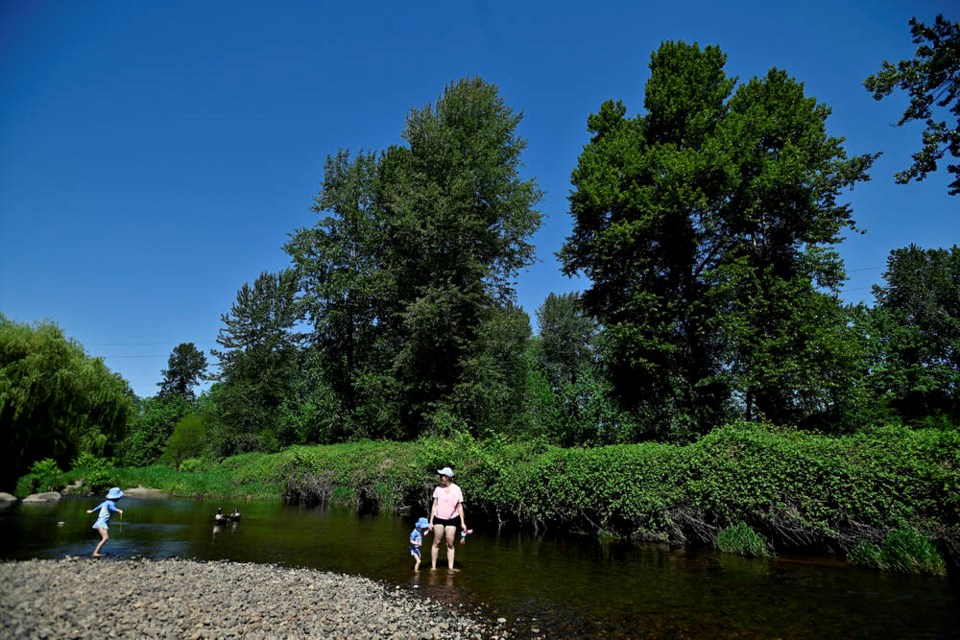New Westminster city council is once again opposing the Trans Mountain pipeline expansion project because of concerns about potential impacts local waterways, but some members of council think that ship has already sailed.
In a 4-2 vote, council has voted to file a statement of opposition to the Canada Energy Regulator website about the Trans Mountain pipeline project that is traversing the Fraser River. The motion, submitted by Coun. Nadine Nakagawa, said the city has concerns about the impacts to the Fraser River stemming from the pipeline crossing near the Port Mann Bridge.
Nakagawa said the letter could simply state that the city has previously taken a position opposed to the pipeline project and continues to have concerns about its impacts on the Fraser River – and all the wildlife and industry that rely on the river.
“I think that this motion is consistent with the city’s previous positions on it, which is that we disagree with the pipeline and the environmental and climate impact as it will be traversing the Fraser River,” she said. “This is such an important piece of our community, and we know that any spill or any harm to this ecosystem would have devastating impacts.”
Nakagawa’s motion also noted the City of New Westminster has endorsed the Fossil Fuel Non-Proliferation Treaty, has developed the Seven Bold Steps for Climate Action and has previously opposed the pipeline expansion project as an intervenor.
Mayor Patrick Johnstone and councillors Ruby Campbell and Tasha Henderson supported Nakagawa’s motion, while councillors Daniel Fontaine and Paul Minhas voted in opposition.
According to Fontaine, there has not been a spill in the Fraser River in the 70-plus years that the current pipeline has been operating, and the new pipeline will have better technology for detecting potential spills. He said the motion is “15 years too late” as the new pipeline is now about 80 per cent completed.
“The pipeline is almost built. None of it is going through our jurisdiction,” he said. “As was noted previously, we don’t really have any influence; this motion can pass or not pass. It will mean absolutely nothing. It really is symbolic.”
Saying that the City of New Westminster is currently going through A Year of Truth as part of its truth and reconciliation efforts, Fontaine expressed concern that local First Nations had not been consulted about the motion to see if they have concerns or support the pipeline project. He said it’s “colonial” to pass a motion opposed to the pipeline despite the fact that “so many First Nations” have signed mutual benefit agreements related to the project.
“This ship has sailed. This pipeline is out,” he said. “And I can tell you, having watched what’s happening in the Ukraine and watching what’s happening in Russia, I would much prefer that the world have Canadian oil, as opposed to oil coming from Russia.”
Nakagawa said the Union of BC Indian Chiefs has detailed its concerns about the project.
“They’ve also described TMX as potentially being a modern-day economic version of a smallpox blanket,” she said.
Henderson said council’s motion isn’t going to make or break the pipeline, but it’s symbolic of the city’s stance on climate action.
“The pipeline is also going to impact Brunette Creek and undoubtedly have impacts on both our local biodiversity as well as global emissions,” she said.
During the discussion in council chambers on Monday night, Fontaine said he’d prefer to be talking about sidewalks, parks or other things the city has control over, but “we’re not because we’re debating a motion about something for which we have no control over.”
Henderson took issue with the comments.
“I think it’s worth clarifying that because we’re talking about sending a letter to a regulatory website does not impede us from talking about other things at council,” she said. “I think that’s misleading, that it’s one or the other and that for some reason, because we are talking with discussing this motion tonight we can’t also talk about things that are important, other things that are important to the community.”
Fontaine called a “point of order”, saying the use of the word “misleading” is not befitting of council’s code of conduct and should not be used.
Johnstone said the City of New Westminster were intervenors in the National Energy Board process and spoke against the project because of it environmental and safety concerns.
“Years ago, when there was an opportunity for us to speak, we did speak about the safety concerns, especially around the Brunette River. Yes, the pipeline is not in New Westminster’s jurisdiction, but it is immediately adjacent to it and impacts on the Brunette River and the Fraser River, immediately upstream of New Westminster.”
In 2015, the City of New Westminster was granted intervenor status in the National Energy Board (now called the Canada Energy Regulation) hearing about the pipeline expansion project. On several occasions, council has voiced concerns about environmental impacts associated with the project.





